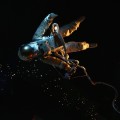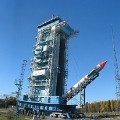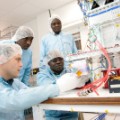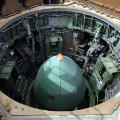Teenage girls to launch Africa's first private space satellite

They may be teenagers, but 17-year-old Brittany Bull and 16-year-old Sesam Mngqengqiswa have grand ambitions -- to launch Africa's first private satellite into space.
They are
part of a team of high school girls from Cape Town, South Africa, who
have designed and built payloads for a satellite that will orbit over
the earth's poles scanning Africa's surface.
Once in space, the satellite will collect information on agriculture, and food security within the continent.
Using
the data transmitted, "we can try to determine and predict the problems
Africa will be facing in the future", explains Bull, a student at
Pelican Park High School.






"Where
our food is growing, where we can plant more trees and vegetation and
also how we can monitor remote areas," she says. "We have a lot of
forest fires and floods but we don't always get out there in time."
Information received twice a day will go towards disaster prevention.
It's
part of a project by South Africa's Meta Economic Development
Organization (MEDO) working with Morehead State University in the US.
Ambitious first
The
girls (14 in total) are being trained by satellite engineers from Cape
Peninsula University of Technology, in a bid to encourage more African
women into STEM (science, technology, engineering, mathematics).
Scheduled
to launch in May 2017, if successful it will make MEDO the first
private company in Africa to build a satellite and send it into orbit.
"We
expect to receive a good signal, which will allow us to receive
reliable data," declares an enthusiastic Mngqengqiswa, of Philippi High
School. "In South Africa we have experienced some of the worst floods
and droughts and it has really affected the farmers very badly."
An El Niño induced drought led to a shortfall of 9.3 million tons in southern Africa's April 2016 maize production, according to a UN report.
South Africa is expected to import between 3 million and 4 million tonnes of maize to meet its shortfall this year.
"It has caused our economy to drop ... This is a way of looking at how we can boost our economy," says the young Mngqengqiswa.
Inspiring girls
Initial
trials involved the girls programming and launching small CricketSat
satellites using high-altitude weather balloons, before eventually
helping to configure the satellite payloads.
Small
format satellites are low cost ways of gathering data on the planet
quickly. Tests so far have involved collecting thermal imaging data
which is then interpreted for early flood or drought detection.
"It's
a new field for us [in Africa] but I think with it we would be able to
make positive changes to our economy," says Mngqengqiswa.
Ultimately, it is hoped the project will include girls from Namibia, Malawi, Kenya, and Rwanda.
Mngqengqiswa
comes from a single parent household. Her mother is a domestic worker.
By becoming a space engineer or astronaut, the teenager hopes to make
her mother proud.
"Discovering
space and seeing the Earth's atmosphere, it's not something many black
Africans have been able to do, or do not get the opportunity to look
at," says Mngqengqiswa.
The
schoolgirl is right; in half a century of space travel, no black
African has journeyed to outer space. "I want to see these things for
myself," says Mngqengqiswa, "I want to be able to experience these
things."
Her team mate, Bull
agrees, "I want to show to fellow girls that we don't need to sit around
or limit ourselves. Any career is possible -- even aerospace."





















/product/44/303993/2.jpg?2398)











No comments
Post a Comment